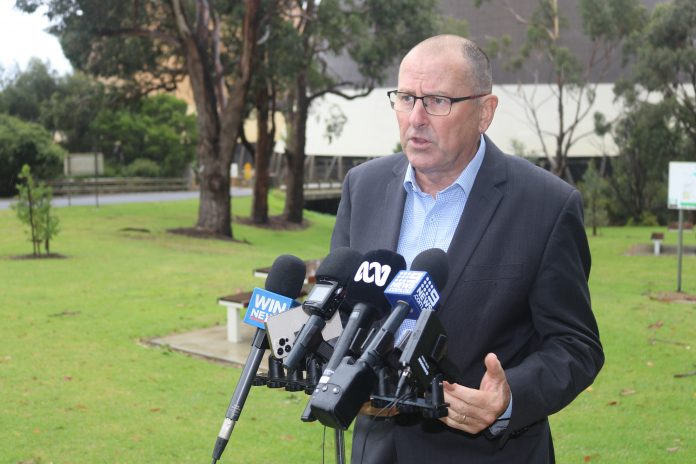By PHILIP HOPKINS
The future of Opal Australian Paper is seriously under threat unless the state government stops green activists from destroying Gippsland’s native forest industry, according to Narracan MP Gary Blackwood.
Mr Blackwood, who is the Opposition spokesman on forestry, said the native forest industry must be protected from the activists’ vexatious litigation.
“Opal Australian Paper are really at risk in terms of their supply of fibre so that they can continue making paper,” he said in a major statement to State Parliament last week.
“But also at risk are their proposed plans for a waste-to-energy plant. If they cannot get fibre to keep producing paper, why would they invest in a waste-to-energy plant that would supply their own power needs plus feed back into the grid and give us somewhere to get rid of our waste?”
Mr Blackwood said Opal Australian Paper also had plans to build a barramundi farm in the
settlement ponds attached to their establishment.
“They also have further plans for a lignin plant. Now, a lignin plant is a plant that uses the black liquor that is a by-product of producing paper. They can turn that black liquor into biodegradable plastics,” he said.
“At the back end of every paper mill in Canada and America is a black liquor plant that produces biodegradable plastics. All of that is at risk unless the government acts now.”
Mr Blackwood said this investment would also provide ongoing opportunities for the workers from Yallourn when it closed in 2028.
“Those opportunities will be taken away as well,” he said.
The contracting force could be lost that harvests the forests and produces the sawlogs and residual wood that go to Australian Paper, local sawmills and pallet manufacturers.
“If we lose those contracts, we lose a massive firefighting force, a firefighting force of people who are experienced in the industry,” he said.
“They know the terrain, they know the machinery they operate, they support our firefighters, both volunteer and career firefighters, and they support Forest Fire Management Victoria. They play an integral part in keeping our communities safe. They will be gone forever.”
Mr Blackwood said the forest workers were resilient, surviving after having been to hell and back over the past 10 or 15 years.
“I know they can survive whatever the future brings them. But is it fair? Is it fair for them to go through the stress of not knowing what is going to happen?” he said.
Only six per cent of native forest was available for sustainable timber production, but the vexatious litigation continued.
“VicForests has defended every court case with factual evidence about their forest management practices that are held in high regard. VicForests have won outright or on appeal every case they have had to answer and defend,” he said.
“However, the time taken by the court process has severely impacted on their ability to maintain supply to their customers. The feral greens know this and deliberately apply for court injunctions to undermine the timber release plan.
“Victoria is already battling with a massive shortage of timber products, and homeowners are being slugged with massive price increases because of the enormous demand and dwindling supply.”
Mr Blackwood said a big factor was the impact of the recent bushfires on softwood plantations, leaving a gap in supply for construction material for at least 10 years.
“However, the alternative, to switch to hardwood, is being undermined by the supply constraints imposed by green federal court action,” he said.
Mr Blackwood said the government’s promise to wind the industry back gradually from 2024 was fast disappearing.
“That promise is hollow now unless this government acts to stop feral activists from taking out court injunctions to stop harvesting,” he said.
In recent days, anti-logging activists had provided daily information to the media that was not based on science or fact.
“They are desperate to bring this industry to its knees before next year’s election,” he said.
“The Andrews government should pull the Minister for Energy, Environment and Climate Change (Lily D’Ambrosio) into line and support the Minister for Agriculture (Mary-Anne Thomas) to do “what I know she wants to do and protect our industry”.
“I do not agree with the closure of it in 2030, but at least keep it going until 2030 as promised and then we can deal with things from then on.”
Mr Blackwood said the CFMEU manufacturing division, had urged government support for the industry.












